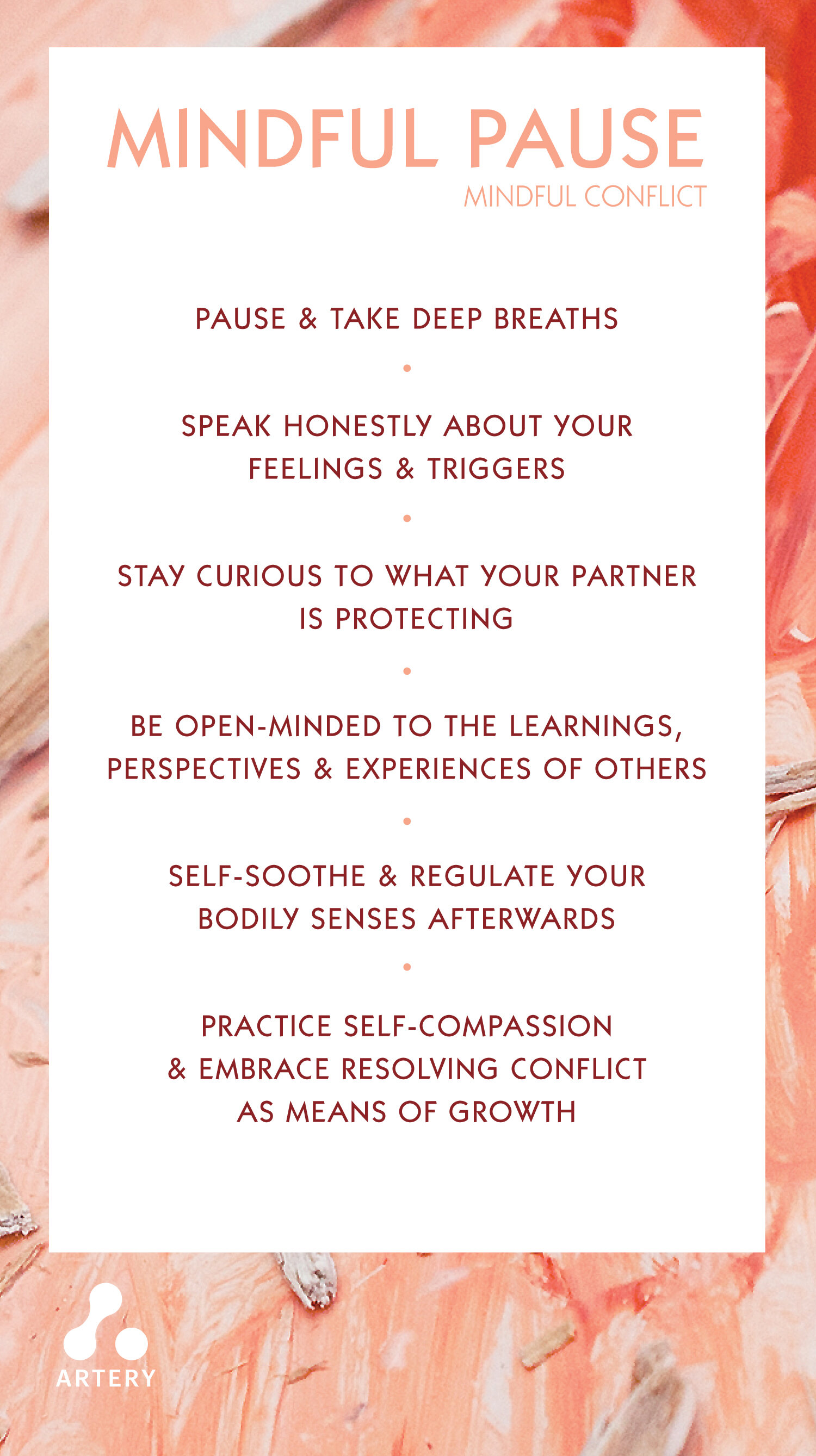Conflict can be an invitation for all kinds of emotions, triggers, and voices from the past housed within you. But if done with intention and presence, it can invite the opportunity for a deeper understanding of yourself and the other, as well as an imagination for what is possible for your relationships to grow into.
I’ve witnessed – and heck, been part of – conflicts that were exacerbated because of how we fought and not about the actual issue. The two-week silent treatment really had nothing to do with the amount of bread you just bought.
My last resource was an exercise in Building Generous Conversation. But we will fall into conflict in our relationships with siblings, parents, cousins, partners, friends or colleagues. So here are tips to keep in mind for a mindful approach to conflict in your shared spaces and relationships.
I’ll be using the term ‘partner’ to indicate your ‘conversation partner’ – whoever that may be.
TIP: You can save the image below and use these steps whenever you need.
1. Pause & take deep breaths
On an emotional level, pausing helps create a space between the trigger and your response and empowers you to break the cycle of reactivity that we automatically fall into.
On a physiological level, deep breathing (taking slow, deep breaths, noticing air rising in and releasing from your chest and belly) increases the supply of oxygen to your brain, lowers your heart rate and regulates your blood pressure, which promotes a state of calmness and feeling grounded.
Other ways you can ground yourself can involve drinking water, sitting down, or feeling your feet on the ground, or your back against a chair.
2. Speak from your perspective
Speak honestly about how you experience the issue from your perspective. Use ‘I’ statements to describe your feelings and triggers: ‘When you did / said _____’, ‘I felt ______’.
Allowing yourself to speak honestly and vulnerably allows insight into your triggers, and could offer a better understanding of what you need to feel supported.
3. Stay curious to what your partner is protecting
Stay curious to what your partner is sharing about their experience of the situation and what it meant to them. Ask questions like ‘Can you say more about this?’, ‘What do you mean by this word?’, ‘Can you describe that feeling to me?’ and speak their words back to show them they’ve been heard and acknowledged.
What are they protecting at times of conflict? What are their fears and values?
What are values you both share and want to protect that can serve as a starting point to how you move from conflict towards connectedness?
4. Be open-minded
We are the experts of our experiences, but as much as we’d hate to admit – the solutions to our struggles aren’t always available from within. And nor should we always burden ourselves with that expectation. Be open to the lived experiences, learnings and perspectives of your partner. They could serve as valuable contributions to the current situation and to the betterment of your relationship as a whole.
5. Self-soothe afterwards
Conflict can wreak havoc on our body. Seek ways to attend to yourself to regulate your bodily senses after your discussion. This can include moving your body, lying down, washing your face, performing ablution, standing barefoot on concrete, using natural objects such as sand or holding a pebble to ground yourself. If you’re really up for it, you can also invite your partner to do the same.
6. Practice self-compassion
Remember, conflict doesn’t mean that you are unloveable or unworthy of a safe, respectful and supportive relationship. And - in a safe, loving, respectful relationship - conflict doesn’t necessarily mean your partner doesn’t love you or want your relationship. Try to practice compassion with yourself and embrace the idea of resolving conflict as a means of imagining new possibilities, and learning to grow as individuals, partners, parents, families and communities.
I find myself going to this reminder during moments of conflict with loved ones:
We Can Do Hard Things – Together.
What tips and skills do YOU think we should keep in mind the next time conflict occurs? Let us know in the comments section below!
